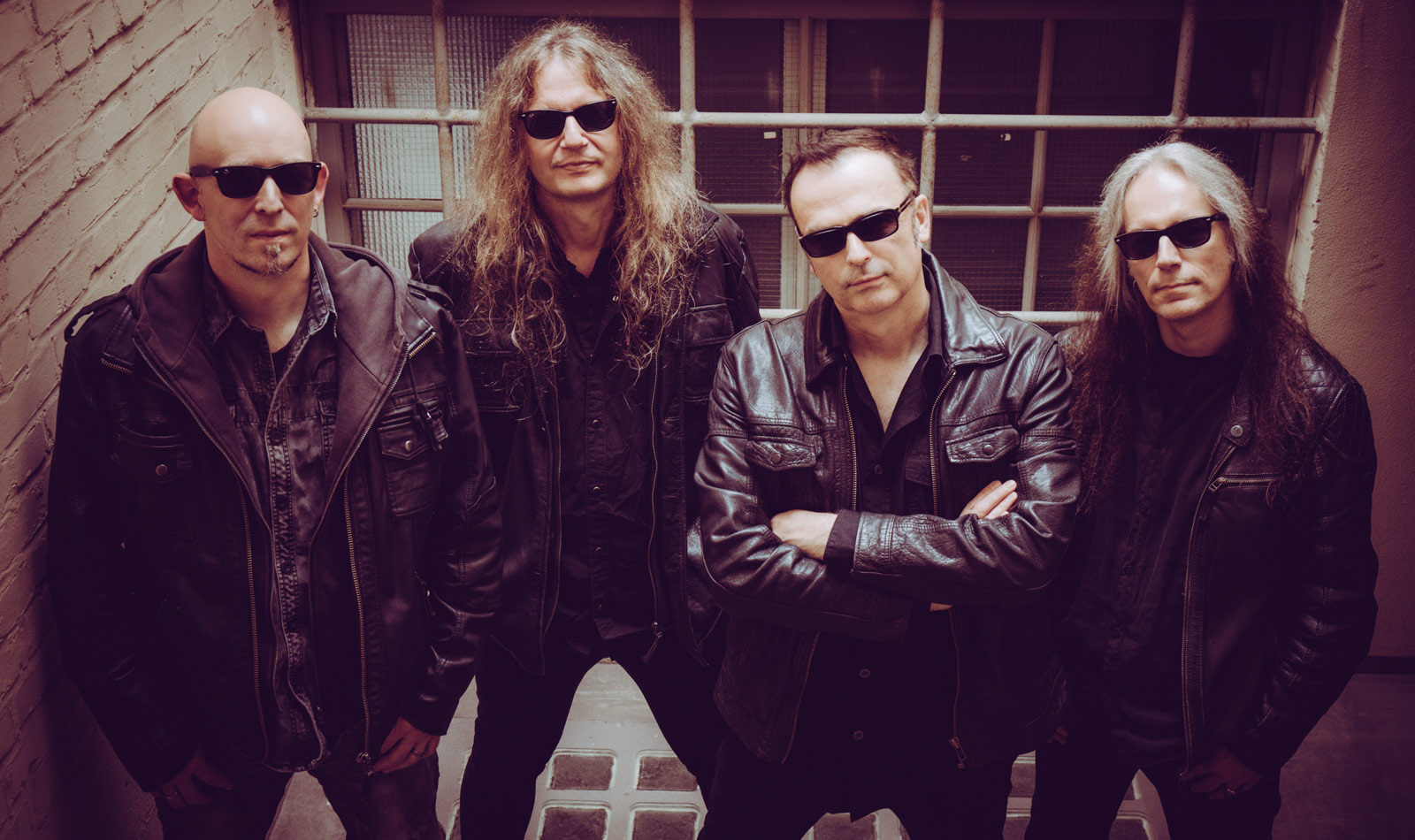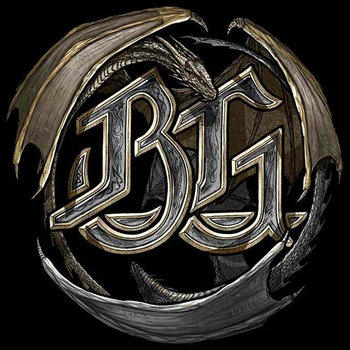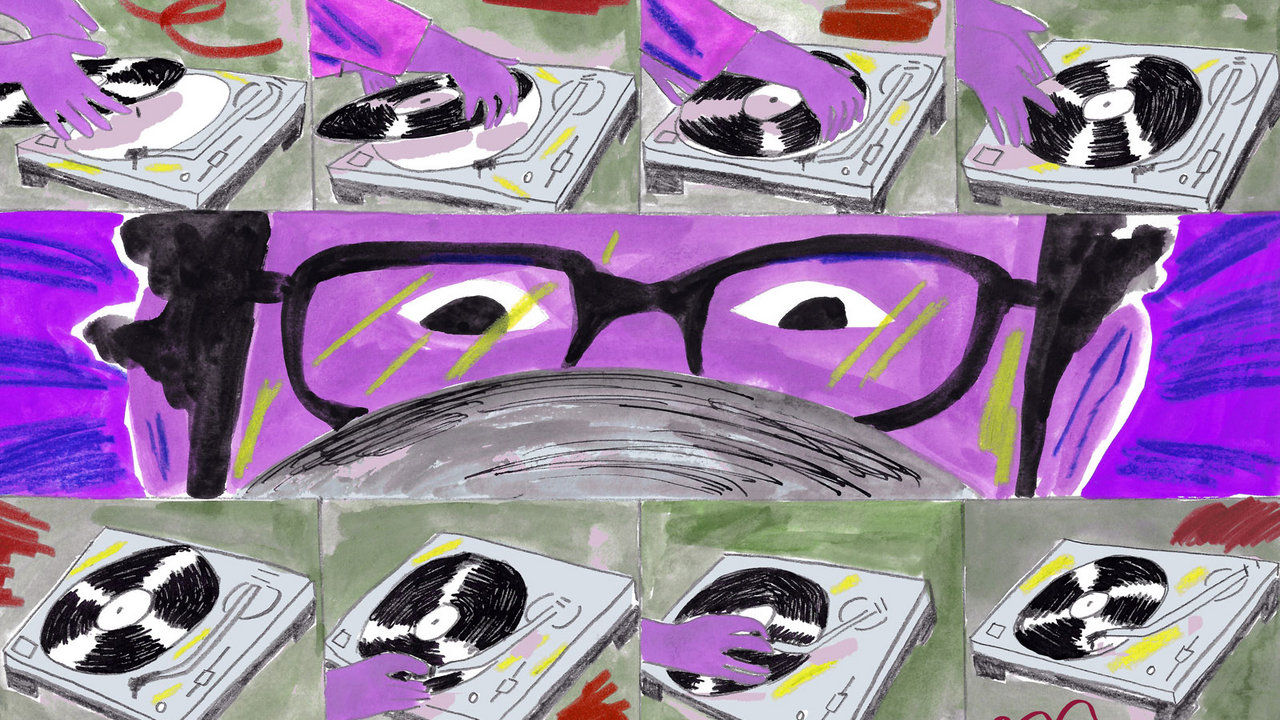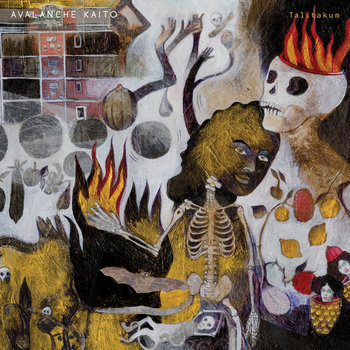
Blind Guardian’s history begins in Krefeld, West Germany in 1984, the year guitarist André Olbrich convinced his high school classmate Hansi Kürsch to join his rehearsal-room rock band.
“Hansi and I were on a school trip, drinking,” Olbrich recalls. “And all of a sudden, he started to sing like King Diamond, really high notes and totally insane. And I thought, ‘What a voice! Unbelievable! He’s blowing me away with this voice, and he can go so high!’”
Olbrich promptly invited Kürsch to sing in his band, but Kürsch demurred, insisting he was a guitar player, not a singer. The band already had two guitar players, and Olbrich refused to add a third. A compromise was soon reached: Kürsch would join the band on lead vocals and bass. (Olbrich ultimately got his wish; Kürsch would put the bass down to focus solely on vocals in 1997.) Lucifer’s Heritage was born. “From that moment, it became a metal band, from a rock-ish kind of thing,” Olbrich says. “The moment Hansi was there, we became a metal band, and we changed that whole thing and changed into Lucifer’s Heritage.”
“I think we took it very seriously from the moment we decided to form a band together,” Kürsch adds. “We were both tired of people not living the dream. Everyone was talking about becoming famous, but talking and doing are two different things.”
Having left their humble rehearsal-room origins behind, the newly christened Lucifer’s Heritage released a pair of demo tapes that attracted the attention of a small German metal label, No Remorse Records. By 1988, they had a freshly inked record deal and a new name to mark the occasion: Blind Guardian. It would soon become one of the most hallowed names in heavy metal. Here, Olbrich and Kürsch walks us through the band’s peerless catalog.
Battalions of Fear


The first release under the Blind Guardian name would be 1988’s Battalions of Fear, a ripping speed metal debut with one eye trained on something much grander. Olbrich, Kürsch, guitarist Marcus Siepen, and drummer Thomen Stauch entered producer Kalle Trapp’s recording studio in October 1987, feeling like they were on top of the world.
“We were flying so high when we entered that studio because, for us, it was like, ‘Okay, now we are part of this. We are part of this heavy metal scene, and we will have our own album,’” Olbrich says. “We were totally sure that it would be the best album ever because the songs were the songs from our demos, and we loved them.”
The Battalions sessions would turn out to be a crash course in studio recording for the young band. Their method of demoing in the rehearsal room in Krefeld didn’t carry over to the antiseptic studio setting, where every mistake would be noticeable. Battalions showcases the unbridled ambition of early Blind Guardian, especially on the centerpiece track “Majesty,” but they still had a lot to learn.
“Things could have been way better if we had more time,” Olbrich says. “Because, for example, with the solos, I remember I had one shot, maybe two if I was lucky. And what I couldn’t record in two shots? My problem. It will stay like this. So that lesson we had to learn, and I think it was good that we learned the lesson because, for the next album, I knew I needed to be prepared, and I could not just go for the regular band rehearsals, but I had to rehearse alone, and I had to compose my solo stuff, so I knew what I wanted to play, and not be in the studio figuring out which notes I need.”
Follow the Blind
If Battalions was a bit hurried because the band were underprepared for the rigors of studio recording, 1989’s Follow the Blind felt rushed for a totally different reason. “With Battalions of Fear, we had no time pressure in songwriting,” Olbrich says. “We had all the songs ready. It was the songs from the demo tapes, we wrote one or two more songs, and the album was ready. And then all of a sudden, our label manager Charly Rinne told us, ‘OK, I want the next album within one year.’ And we said, totally naïve, ‘Oh, no problem!’ Because we thought one year is so much time.”
That year flew by. Olbrich was in the civil service and Kürsch was working an apprenticeship. The band had not yet decided to make Blind Guardian their full-time job, which meant songwriting and rehearsals were stuffed into late nights after work. “We learned for the first time that this is not so easy, to write music on demand,” Olbrich says. “So many things were rushed, and we only put the ideas together and rehearsed the songs a few times in the rehearsal room.”
The last song they wrote for Follow the Blind was “Valhalla,” a song Olbrich thought was mere filler and nearly cut from the track listing. Today, it’s arguably the most popular song Blind Guardian ever wrote, a live staple that regularly inspires extended crowd singalongs. Olbrich is at peace with that.
“We were able to write a great song, which ‘Valhalla’ obviously is if you are not thinking too much,” he muses. “If you just take what comes out of you, if you are totally stressed, almost in [a] panic, and you take everything that comes out first. You take the first idea. You don’t have a choice to wait for the second idea; you just grab what is there. And that, I think, is very pure, very essential—and that is what ‘Valhalla’ is. That is really pure Blind Guardian.”
Tales from the Twilight World
Tales from the Twilight World was the record where Blind Guardian started to put everything together. After two albums of relatively straightforward speed metal, Tales saw the band introducing the winding song structures and meticulously layered arrangements that would become their signature. Civil service and day jobs were in the rearview mirror. The band had become Olbrich and Kürsch’s work.
“We took all the money that we earned from the first two albums and bought our own little studio because we said if we want to work out the songs, we need to record them,” Olbrich recalls. “We need to have the same process we have in the studio situation. We need to learn this. We need to pre-produce the songs before, and this is only possible in a little studio. So, we bought the setup. And from that moment that we had this technical equipment, Hansi and me, we were living in the rehearsal room. We were really using these machines and trying to work on the songs every minute we had.”
“We always love to try out things,” Kürsch adds. “The passion for experimenting is essential in our songwriting. When we received our own first studio equipment after Follow the Blind, our options started to become endless. This is how it feels up until now.”
Tales highlights like “Traveler in Time,” “Lost in the Twilight Hall,” and “The Last Candle” were complex, heavy, and melodic all at once. In retrospect, it feels like the invention, or at least the codification, of power metal—a term Olbrich and Kürsch both avoided in our conversations, it should be noted. Whatever you call it, Tales was clearly the sound of a band discovering its own unique voice.
“We were thinking about ourselves as musicians,” Olbrich says. “How can I bring my character into something? How can I have a tone as a lead guitar player? And Hansi, of course, was finding his own identity as a vocalist, and for the first time, I think he sounded like the Hansi we know, which is just so charismatic. On Follow the Blind, he’s trying to sound a little bit more thrashy, and we didn’t exactly know where to go. But in Tales, we knew. We knew. Everybody knew where we wanted to be and how we wanted to sound.”
Somewhere Far Beyond
“With Tales, mainstream success came,” Kürsch says. “Everybody knew what Blind Guardian was about. Apart from simply being naturally better than the first two albums, it was the awareness of people which made the difference. Realizing the success and connected expectations of people with regard to the next album made the creation of Somewhere Far Beyond the most important and difficult songwriting period.”
“It created a big pressure on us as songwriters,” Olbrich agrees. “Because we thought, ‘Oh my God, we have such a successful album, how can we ever top this?’”
Somewhere Far Beyond finds Blind Guardian expanding on the melodic ideas of Tales while simultaneously introducing far more sonic elements—the bagpipes on “The Piper’s Calling” and the title track; the synthesized orchestra on “Theater of Pain”; the plaintive acoustic guitar on future fan favorite “The Bard’s Song (In the Forest)”; the medievalism of its sequel track “The Bard’s Song (The Hobbit.)” The band expanded outward while doubling down on the self-discovery they’d made on Tales.
“There was a clear progression from Tales to Somewhere,” Olbrich says. “So, we tried to make the guitars sound more rich, and really top everything we did in Tales, and I think we came up with a really strong album.”
Imaginations from the Other Side
Somewhere Far Beyond would mark the end of Blind Guardian’s relationship with Kalle Trappe, the producer who had taken them under his wing back in their rehearsal-room days. (“He was very conservative as a producer, and when I came up with innovative ideas regarding sound or production, he always blocked me,” Olbrich laments.) For 1995’s Imaginations from the Other Side, the band sought out Flemming Rasmussen, the legendary engineer behind Metallica’s ’80s classics.
“He really knows how to kick a musician’s ass,” Olbrich says. “He was only into performance and groove and character. He wanted to push us as musicians, and that’s what he did. So, for the first time, I was playing until my fingers were bleeding because in the beginning, nothing was good enough for Flemming. He was saying, ‘Hey, when are you done with rehearsing?’ And I’d say, ‘I’m giving 100% already!’ And he’d say, ‘Try more because I will not accept this.’”
With Rasmussen behind the mixing board, Blind Guardian turned in their tightest, most dialed-in album to date. Imaginations was a hit, and it became the band’s long-awaited international breakthrough, as the rest of the global metal scene learned what German and Japanese audiences already knew. It was also a richly layered, baroque power metal album coming out in what was a down time for melodic heavy metal. Grunge was still dominant, nu metal was ascendant, and the underground was fixated on increasingly extreme death and black metal bands. Olbrich didn’t care. His musical heroes from London had shown him the way.
“We were looking up to Queen,” he says. “They were always doing their own thing, no matter what. They were totally individual and independent from the scene, and that’s what we wanted to become as well. If you look too much to the other bands and try to orientate yourself to the successful trends, you can only go down because you will always be a little bit later than these bands. We wanted to be the band who invented things.”
Nightfall in Middle Earth
Given its present-day status as an undisputed classic, it’s difficult to imagine what a huge gamble Nightfall in Middle Earth seemed like at the time. Blind Guardian had always had nerdy proclivities, and they’d always written lyrics based on their favorite sci-fi and fantasy books. (“I never considered it as nerdy, nor did I consider myself to be a nerd,” Kürsch protests. “It was André and Marcus who were nerds. They were into computer role-play stuff, while I was the cool guy. I read books.”) With Nightfall, they went farther down the fantasy road than they ever had before, creating a 22-track metal opera based on Tolkien’s The Silmarillion.
“However this comes out, [we thought] this album will be great for all Tolkien fans and people like us, who love fantasy,” Olbrich recalls. “We were doing this a little bit for ourselves as well. We left these commercial thoughts out. We knew already that our label would probably not like it that much. There were not hits, radio singles, MTV video clip things on this album. We knew this. But we said, ‘So what? It’s what we want to do.’”
Nightfall’s structure also presented Olbrich and Kürsch with a new challenge. Rather than composing songs that would stand alone, as they had on Imaginations, they also had to think about how they interacted with the overall narrative. “Hansi said, ‘We need something melancholic, or we need a battle, or we need this, that,’” Olbrich remembers. “We were really trying to let ourselves fall deep into this world and come up with ideas that fit into this Tolkien-ish feeling. And I think that we learned a lot because it was a different kind of working process, but it was so interesting, and we learned so much from that time of walking a different path.”
“This might have been the departure of classical, old Blind Guardian songwriting,” Kürsch says. “We did not feel so back in the day, but looking back, that might have been the point. The whole songwriting is in constant progression. So, again, for us, it turned out as a natural and organic evolution away from Imaginations towards something new.”
A Night at the Opera
Nightfall was also significant for how it let Olbrich pursue his growing interest in classical music and orchestral arrangements. That obsession would bear even more fruit on Nightfall’s follow-up, 2002’s A Night at the Opera. “I was totally amazed that I could play classical instruments on a keyboard and record them,” Olbrich says.
“We were one of the bands who were experimenting with this, creating these epic, more classical-oriented songs,” he continues. “And I still think the fusion of these sounds is amazing. It fits so well to metal music. You can make some emotions that you build in a story of song or with the melodies of a song, you can feature these emotions. You can make them even stronger if an orchestra comes in.”
The boldest experiment on A Night at the Opera was “And Then There Was Silence,” a 14-minute symphonic metal adaptation of Homer’s Iliad. The song delivers an almost overwhelming deluge of musical ideas, drenched in orchestral instrumentation, with only the chorus ever repeating. By the time they started recording Opera, Olbrich and Kürsch had begun working on their classical music album Legacy of the Dark Lands. Olbrich found the style of writing he’d adopted for Legacy liberating, and “Silence” was his attempt to apply it in a metal context.
“There’s no rule,” he says. “I just tell a story with music and go somewhere. And, of course, then I had to add drums and guitars, but it worked very well. I wanted to break out of the regular song stream that you have verse/chorus/verse/chorus/solo/chorus/chorus, boom, hit—you know? I didn’t want to be limited to that. And I felt that heavy metal has the freedom to lead you somewhere in a story, and it can go through a left path, and then go back to the straight way, and then go somewhere else. It’s like walking in a wood, and if there’s a tree coming, you change the route. You don’t need to be on the straight path all the way.”
A Twist in the Myth
“After we released A Night at the Opera, there were some years where many bands did these retro albums,” Olbrich sighs. “They tried to sound like the ’80s. And for me, that was terrible, and all these albums I found terrible. I had the feeling that they walked backwards. They wanted to make the ’80s happen again, but what bullshit! Time is walking only in one direction.”
A Twist in the Myth, an oft-overlooked gem in the Blind Guardian catalog, was Olbrich’s response. Its harsh production style, short (but densely mixed) songs, and embrace of odd synth sounds were about as far from the prevailing retro winds and the band’s own A Night at the Opera as possible. Olbrich is hard on himself now for how Twist turned out, but its best songs—“This Will Never End,” “Otherland,” “Fly”—are top-tier Blind Guardian. He says he wants to keep tinkering to make them even better.
“When I listen to it nowadays, I hear many things that I would do different,” Olbrich admits. “But at that time, that was all we knew about creating such music, and it was, in our minds, the best we could do. But I think maybe one day I would like to grab some of these songs and rework them because there’s amazing ideas, but the songs could be arranged in a better way and be more catchy. I understand now that this album was really, really difficult to get into for someone who will listen to it the first time. [They] will be overloaded with too much information, and that’s not cool. I know how I would produce this album now.”
At the Edge of Time
After the disappointment of Twist, Olbrich turned back to the epic symphonic experiment of “And Then There Was Silence” for inspiration on how to move forward. By then, knee-deep in the sessions for the Legacy of the Dark Lands release, Olbrich was itching to use a real, human orchestra on a Blind Guardian album. “We said we could try to write something epic and make it better because we had learned so much recording real orchestras, and “And Then There Was Silence” was programmed,” he says.
The City of Prague Philharmonic Orchestra is a crucial supporting player on At the Edge of Time, which took the maximalist impulses of A Night at the Opera and made them feel more organic. “Sacred Worlds” and “Wheel of Time” serve as the album’s bookends, and at nine minutes apiece, they deliver the sweeping scale of “And Then There Was Silence” at a slightly more compact runtime. A few ultra-heavy songs in the Twist vein dot the album’s track listing as well; “Ride Into Obsession” could pass for thrash if not for the unmistakable melodic phrasing of Olbrich’s lead guitar. Still, At the Edge of Time was the necessary reset that allowed Olbrich and the rest of the band to move past the perceived failures of Twist.
Beyond the Red Mirror
2015’s Beyond the Red Mirror is a natural companion to At the Edge of Time. The two albums are sequenced and paced nearly identically; Mirror places the nine-minute “The Ninth Wave” and “Grand Parade” in the same slots where Edge had put “Sacred Worlds” and “Wheel of Time.” Olbrich was, at the time, happy to be working in epic mode and using orchestras to boost the Blind Guardian sound.
“We didn’t do a hard cut between these two albums,” he confirms. “It was more like, ‘OK, let’s try to make it sound even better and progress with this style even more like we did between Tales and Somewhere.’ We wanted to set the peak point with Beyond the Red Mirror. And with the songwriting, I think we did, but with the production, not.”
Indeed, the orchestral elements on Mirror feel strangely muted compared to the robustness of Edge, and the album is a bit limp as a result. It still contains some excellent songs—“Prophecies” sticks out as a particular highlight—but it also found Olbrich hitting a dead end on the “epic orchestral Blind Guardian” road. “For me, at that moment, I saw there is no need for me to continue with this epic style,” he says. “We did this for a while, but now it’s time to do something else. We need a cut again.”
Legacy of the Dark Lands
That hard cut would come soon enough, but first, Olbrich and Kürsch had to release the labor of love that had been gestating for more than 20 years. Legacy of the Dark Lands, credited to the Blind Guardian Twilight Orchestra and containing precisely zero electric guitars, came out in 2019. The oldest songs on Legacy date back to the Nightfall in Middle-Earth era. Its release must have felt like an enormous exhale.
“If we speak about the pure experience, it was a process of constant learning,” Kürsch explains. “I would say that we increased our abilities as musicians a lot, and we also gained tons of knowledge about functional songwriting and physics in music. That sounds more theoretical than it is. For the soul of the music, that knowledge is efficient.”
It’s a testament to the goodwill Blind Guardian had built up over the decades that they could release a non-metal album and have their fans understand where it was coming from. The band has always been a laboratory for Olbrich and Kürsch, and Legacy of the Dark Lands was their grandest experiment of all. That’s why they both cherish it so much.
“It was just amazing because over that time period of 20 years, there was such a learning process,” Olbrich gushes. “Only by this could it get to this level, and I’m really happy that we had this time and that were able to produce that album in the way it is. I don’t want to change anything. For me, that is the perfect album and the best we ever did.”
The God Machine
“We for sure wanted to set a statement after the orchestral album, which dictated our thoughts for such a long time,” Kürsch says. “Now we were free to do whatever we wanted to do. The God Machine is unleashed Blind Guardian.”
“Unleashed” is the perfect word for The God Machine. It’s the heaviest Blind Guardian album since at least A Twist in the Myth, maybe even earlier. It bursts through the door with “Deliver Us from Evil” and “Damnation,” a pair of pummeling speed metal songs. Those are followed by “Secrets of the American Gods,” a seven-minute sonic labyrinth that’s the closest thing The God Machine has to an epic. Even as its arrangement sends it spiraling down a series of corridors, the song stays rooted in Marcus Siepen’s crunching rhythm guitar. Notably, Siepen, drummer Frederik Ehmke, and bassist Barend Courbois are just as important to the sound of The God Machine as Olbrich and Kürsch.
“After a long time, we started rehearsing again as the band,” Olbrich says. “And we felt that energy and that heaviness of the band that I missed for the whole time we worked on Legacy of the Dark Lands. That was one reason why we became fast and harder again.”
The God Machine is also the first COVID-era Blind Guardian album, and while their songs are still likelier to be about elves and wizards than global pandemics, the album does seem to capture what Olbrich calls the “time-spirit” of the world today.
“The whole world felt harsher,” Olbrich says of the early days of the pandemic, when work on The God Machine began in earnest. “You could see how people talked to each other. It was all a little bit more tension, and a little bit more aggression. I felt almost like in my teenager days, when I was frustrated. And that was the feeling of The God Machine. We let all our frustration out and put all the energy in there. It’s more speed metal. It’s more hard, fast. For me, that is reflecting our present time, and that is always important. And probably, if it helps me work out my feelings that I have during these days, it may help other people as well.”







